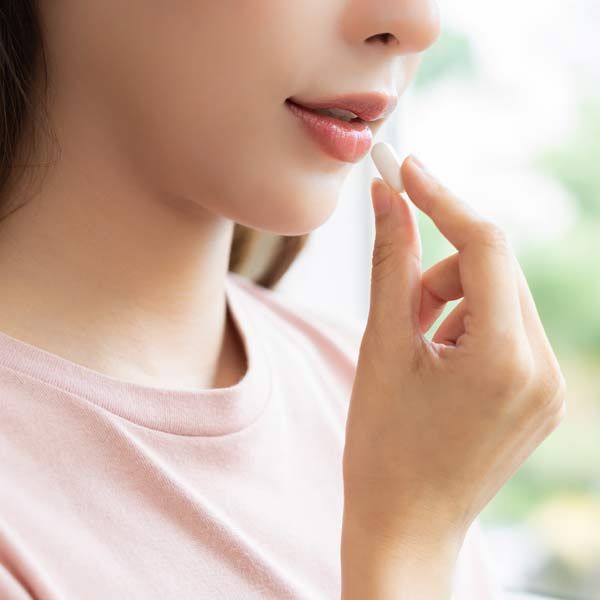PMDD Treatments NJ and NYC – Victory Medical Institute

Premenstrual Dysphoric Disorder Therapy Serving Patients in Morris Plains New Jersey and Manhattan New York
Understanding PMDD and Perimenopause: How Integrative Medicine Can Transform Your Life
Robin is a patient in her mid-40s with whom I have been friends for more than 20 years. We were having a conversation in my office, and she said, "I feel like such an old woman." Tears of frustration were welling up in her exhausted eyes. "I can't think straight," she sobbed bitterly. "I can't sleep. I just don't feel like me anymore."
Robin went on to describe her emotional life as "out of control." She was struggling with the usual rollercoaster of mood swings and anxiety, plus the unhappy reality of her plummeting libido and her distress over how it was impacting her marriage. Robin is not alone. She is actually far from alone in her struggles, and I want to talk to you today about PMDD and perimenopause, and how integrative and regenerative medicine can transform your life if you are struggling, as Robin was, with these two together.
What is PDMM?
Premenstrual Dysphoric Disorder (PMDD) is NOT simply a severe version of PMS. It's a significant and complicated hormonal issue that can cause severe emotional and physical symptoms that can get in the way of daily activities. While every patient is different, most women in their 40s are entering perimenopause and now have a double whammy. In addition to increased PMS or PMDD symptoms as a result of the wild hormonal swings that come with perimenopause, they also have to contend with dropping estrogen, progesterone, and testosterone, which directly and negatively impact libido and sexual wellness.
Hormonal fluctuations can also impact sleep, cognition, and daytime energy. PMDD affects between 5 and 8 percent of menstruating women. The hormonal roller coaster that is perimenopause can exacerbate it to the point where relationships suffer, and the divorce rate among women who have perimenopause plus PMDD is significantly higher.
How Traditional Medicine Treats PDMM
The traditional medical approach to treating PMDD, or Premenstrual Dysphoric Disorder, generally involves the use of Antidepressants. They will likely also prescribe hormonal treatments like birth control pills to help regulate hormonal fluctuations. For the physical pain symptoms, nonsteroidal anti-inflammatory drugs (NSAIDs) are often used to provide some relief. CBT, or Cognitive Behavioral Therapy, is also considered a viable option to help with the more emotional symptoms of PMDD. All of these drug treatments often come with a host of undesirable side effects.
Common Symptoms of Premenstrual Dysphoric Disorder (PMDD)
Common symptoms of PMDD include severe mood swings, irritability, anxiety, and depression, which can significantly impact daily functioning. Physical symptoms such as bloating, breast tenderness, headaches, and fatigue are also prevalent. Additionally, many individuals experience changes in sleep patterns and appetite, often leading to difficulties in managing everyday activities during the luteal phase of their menstrual cycle.
Common Causes of PMDD
Common causes of Premenstrual Dysphoric Disorder (PMDD) are believed to be linked to hormonal fluctuations that occur during the menstrual cycle, particularly changes in estrogen and progesterone levels. Neurotransmitter systems, especially those involving serotonin, may also play a significant role, as these chemicals are associated with mood regulation and emotional responses. Genetic predisposition, stress, and personal or family history of mood disorders can further contribute to the likelihood of developing PMDD.

My Integrative Medicine Treatment Plan for PMDD
As an integrative and regenerative medicine doctor, I first and foremost want to empower patients. I achieve this through a comprehensive, drug-free, evidence-based treatment plan tailored specifically to each patient.
For PMDD, as well as perimenopausal low libido, the solution, as always, requires a multi-pronged approach from this list of possible therapies and treatments.
The Nutritional Aspect of PDMM Wellness
Nutrition plays a crucial role in the protocol. A diet rich in low-glycemic foods, lean proteins, healthy fats such as omega-3 fatty acids (found in fish or supplements), and high-fiber vegetables can help stabilize energy levels, balance hormones, and promote mood stability. Limiting caffeine, refined sugars, and alcohol can also significantly reduce anxiety and irritability.
- Supplementation - Supplementation can be very supportive. After reviewing the patient's history and condition, we can add very targeted supplementation to help mitigate the symptoms of PMDD. Depending on your overall treatment plan, some or all of the following supplements may be recommended as part of the healing plan:
- Magnesium: For restful sleep, calming anxiety, and reducing physical discomfort.
- Vitamin B6: To support the production of serotonin and stabilize mood and emotional well-being.
- Vitamin D3: A critical mood and hormone balancer. Vitamin D3 will be administered at a dose specifically tailored to each patient based on laboratory testing results.
- DIM (Diindolylmethane): A naturally occurring compound that helps to balance estrogen and supports healthy estrogen metabolism to help with PMDD-related mood changes and libido.
- Maca Root and Evening Primrose Oil: Have been shown in studies to significantly increase desire, reduce mood swings, and reduce breast tenderness.
- Herbs and Peptides for PMDD and Low Libido - Vitex (Chasteberry): Balances progesterone production and reduces irritability. PT-141 (Bremelanotide): Targets specifically libido and sexual desire/arousal by activating melanocortin receptors in the brain. BPC-157 and Thymosin Beta-4: General wellness boosting peptides that have been shown to reduce inflammation, improve mood, enhance restorative sleep, and support mental and physical health.
The Nutritional Aspect of PDMM Wellness
Nutrition plays a crucial role in the protocol. A diet rich in low-glycemic foods, lean proteins, healthy fats such as omega-3 fatty acids (found in fish or supplements), and high-fiber vegetables can help stabilize energy levels, balance hormones, and promote mood stability. Limiting caffeine, refined sugars, and alcohol can also significantly reduce anxiety and irritability.
Supplementation - Supplementation can be very supportive. After reviewing the patient's history and condition, we can add very targeted supplementation to help mitigate the symptoms of PMDD. Depending on your overall treatment plan, some or all of the following supplements may be recommended as part of the healing plan:
- Magnesium: For restful sleep, calming anxiety, and reducing physical discomfort.
- Vitamin B6: To support the production of serotonin and stabilize mood and emotional well-being.
- Vitamin D3: A critical mood and hormone balancer. Vitamin D3 will be administered at a dose specifically tailored to each patient based on laboratory testing results.
- DIM (Diindolylmethane): A naturally occurring compound that helps to balance estrogen and supports healthy estrogen metabolism to help with PMDD-related mood changes and libido.
- Maca Root and Evening Primrose Oil: Have been shown in studies to significantly increase desire, reduce mood swings, and reduce breast tenderness.
- Herbs and Peptides for PMDD and Low Libido - Vitex (Chasteberry): Balances progesterone production and reduces irritability. PT-141 (Bremelanotide): Targets specifically libido and sexual desire/arousal by activating melanocortin receptors in the brain. BPC-157 and Thymosin Beta-4: General wellness boosting peptides that have been shown to reduce inflammation, improve mood, enhance restorative sleep, and support mental and physical health.
- Advanced Integrative Therapies -
Advanced Integrative Therapies encompass a variety of holistic approaches that combine conventional medical practices with complementary therapies to promote healing and well-being. These therapies may include modalities such as:
- Shockwave Therapy (Omniwave and Gainswave): Significantly increases blood flow, regenerates nerve and vascular tissue, and can improve sexual sensation and libido by a long shot.
- Hyperbaric Oxygen Therapy (HBOT): oxygenates tissues, improves mood and cognitive clarity, reduces inflammation, and provides an overall vitality boost.
- Pulsed Electromagnetic Field Therapy (PEMF): Enhances cellular repair and has been shown to reduce anxiety, support healthy hormonal regulation, improve blood flow, and has a positive effect on libido.
- IV Therapy - IV infusions are far more effective than supplementation as the nutrients are delivered directly and bypass the digestive system. An IV Therapy PMDD treatment protocol may include, but is not limited to, High-Dose Vitamin C, which supports adrenal function, energy, mood stability, and immune support. ALA (Alpha-Lipoic Acid) optimizes blood sugar control, mitochondrial energy production, reduces brain fog, and improves overall neurological function. Glutathione, a master antioxidant that detoxifies the body, balances hormones, and improves cognitive function and overall energy levels.
- Hormone Replacement Therapy (HRT) - Customized HRT can significantly relieve perimenopausal symptoms by balancing estrogen, progesterone, and testosterone levels to substantially reduce mood swings, anxiety, depression, and to increase sexual desire, lubrication and comfort with intimacy dramatically.
- Low-Dose Naltrexone (LDN) and Rapamycin - Low-Dose Naltrexone (LDN) has been shown to support mood stability, immune function, and has potent anti-inflammatory effects, and can potentially improve anxiety and depression symptoms, and can be an excellent adjunct for PMDD. Rapamycin has shown benefits in many aspects of the aging process, which can improve overall cognition and mood stability, as well as support immune function. These two together are also thought to be able to impact perimenopause positively.
- Mind-Body Practices - Mindfulness meditation, yoga, and breathwork can all have a significant impact on reducing anxiety, stress, and emotional volatility. This, in turn, leads to increased resilience and emotional stability. Acupuncture can further support hormonal and emotional health.
- CBT and Counseling - CBT, or Cognitive Behavioral Therapy, is another excellent option to work through negative thought patterns, anxiety, and depression to support emotional and relational health as well as to improve intimacy significantly.
- Regular Exercise and Sleep Hygiene - Regular, moderate exercise and good sleep hygiene can significantly improve mood, reduce anxiety, and increase libido by optimizing overall health and hormonal balance (Sleep Foundation, 2023).
Case Study: A Patient-Centered Plan For PMDD
Remember my patient Robin? She started with a comprehensive approach that included: dietary changes, specific supplements, and peptide therapy, along with shockwave, HBOT, PEMF, IV infusions, regular acupuncture sessions, CBT and counseling, LDN, rapamycin, and carefully customized HRT. Within a few months, she reported a significant reduction in anxiety, more stable moods, better sleep, and a return of her libido. Her relationship with her husband flourished, and she was once again enjoying the intimacy that had been missing in her life.

Contact Victory Medical Institute to Discover The Personal PMDD Treatment Plan That Will Work For You
PMDD, along with perimenopause and low libido, can indeed be overcome with holistic and complementary treatments. We can work together to help turn your life around, restoring your health and well-being, improving your relationships, and rekindling the joy and intimacy in your life. You deserve the care and help that you need. I encourage you to take that first step towards taking control today.
Please contact us today.

